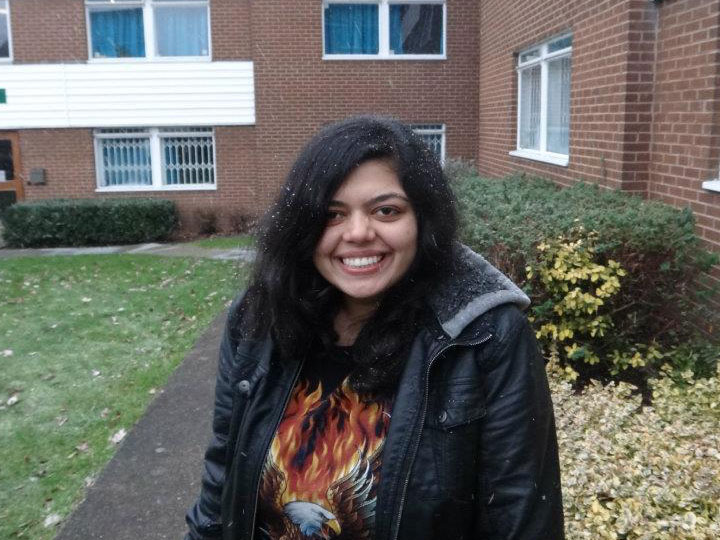Anwesha Pal graduated from WBNUJS in 2009, and thereafter pursued her LL.M in IPR from Nottingham University. Presently, she is an Assistant Professor at Institute of Law, Nirma University.
We had earlier reached out to her to share her LL.M experience at Nottingham:
Anwesha Pal on LL.M. in Intellectual Property from Nottingham University
In this interview we speak to her about:
- Pursuing Masters from Indian and Foreign Universities
- Best Universities for Intellectual Property studies
- Opting for teaching and on scoring higher
When and how did you decide to pursue Masters and further studies?
It was in my final year of NUJS that I wanted to study further and wanted to apply to the UK before the fees were hiked up due to the cutting down of the Government subsidies to universities. So I zeroed in on various universities including King’s, Queen Mary, UCL, Warwick and Nottingham, out of which I chose University of Nottingham to do my LL.M in International Commercial Law. However, I didn’t think of getting into academics full-time then, and kept my options open.
Which universities did you select for your LL.M?
I chose University of Nottingham, King’s College London, UCL, Queen Mary University of London, University College London, and University of Warwick.
How different is an LL.M in India from one abroad?
There is quite a difference between the two of them. LL.M in Indian universities is more of a spoon feeding business. However, in the UK I found that the students had to take the responsibility of their own learning themselves. One difference that I often talk about with my friends is the way dissertations are treated in both the countries. In the UK we were supposed to find out our own topics and research all by ourselves without any help whatsoever from the supervisor and only at the time of getting the topic approved one can meet and consult the supervisor. But in Indian Universities the dissertation supervisor plays a huge role in the shaping of your dissertation. If you do not have a good supervisor you actually will not learn anything and eventually your dissertation’s quality could be compromised.
What led you to pursue LL.M from Nottingham even after having finished your LL.M from India?
The laws in India are mostly influenced by the west and to learn from the best people in the business was the biggest incentive for pursuing the LL.M. The academic program was designed in a way to provide ample opportunities for research. Moreover, an international exposure is always a good thing to have. It gives you perspective with regard to the various learning patterns adopted by various students and cultural exchange in more ways than one proved to be a beneficial life lesson too.
Do you think the Indian higher studies regime requires an overhaul?
Indian higher studies in law do not need a complete overhaul but definitely needs a stricter curriculum. With all the debate about scrapping the one year LL.M, I do not support the view. I think a trimester system with an intense program dealing with the most important subjects at national law schools would attract not only the best students but would bring in better teachers as well who will be able to deal with such a challenging program. The responsibility of learning in such cases increases manifold for the students and encourages self-learning rather than spoon feeding.
Which universities do you think are best suited for someone who wants to specialise in IPR?
In the UK, I found the best faculty for IPR in the University of Nottingham, alternatively one may choose King’s and other colleges under the University of London. In India, apart from GNLU, I have little knowledge about any other national law schools that are providing a specialization in IPR. However, in India there is little scope to choose your subjects since the UGC has made a few subjects completely mandatory for LL.M
Have you considered Doctoral Studies?
I have considered doctoral studies and am working on my research proposal. I am keeping my options open at the moment, and haven’t zeroed in on a particular university yet.
What does it take for a lawyer to get into academia?
One cannot possibly enlist the essential qualities, since every student or every subject that one is working at brings forth absolutely new challenges with itself. But one can say without a doubt that an academician who is into active teaching and researching needs an immense amount of patience and should not have a fragile ego. There is so much even a teacher can learn from her students. Apart from patience, one needs to have the tenacity to keep working to better one’s teaching and learn more things, instead of being complacent about the knowledge gained so far.
What were your goals after graduating from Nottingham?
Nottingham opened new vistas for me and teaching was not the only option that I had considered back then. The decision to move into academics happened gradually through working for iPleaders and at IMS. The experiences I had while working at both the places were extremely rewarding and enriching. Teaching at Nirma has been a learning experience and equally rewarding so far, mostly because of the diverse student body that has an immense amount of potential, academically.
What advice do you share with your students on scoring higher grades?
Scoring high grades is more often than not a result of learning through self-studying. Listening to the teacher patiently and interacting in the class goes a long way in this respect. Taking notes is very important as they are your guides when reading for yourselves. However, I think it is a crime on a student’s part to expect readymade notes from the teacher at the university level.
What would be your advice for law students who want to take up the profession of teaching?
One must choose the profession of teaching law for the love of teaching and not only for the love of law. Teaching is a very different ball game from learning for oneself. Different students have very different needs and learning methods and one who can cater to all of them efficiently is considered to be a good teacher. Although, one can only strive to do so.
























